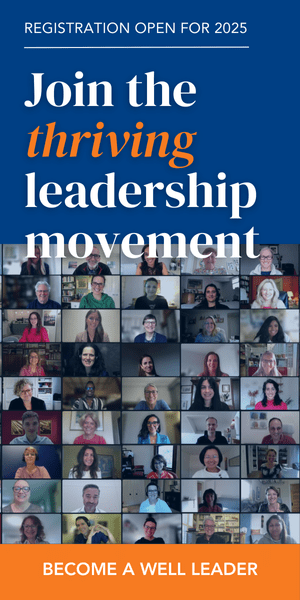Hinged forward at the hips, hands intertwined behind my back, arms over my head… as I bend my way through a twice-weekly ritual of yoga, I reflect on my recent whirlwind of back-to-back conferences. (Yes, even while doing yoga, one can be caught multi-tasking!)
One of the conferences featured crowds sporting formfitting athletic apparel (and the occasional pair of baggy sweatpants). The other: trendy suits accompanied all the hand shaking and business card swapping. Can you guess which was the Yoga Journal Conference and which was the Chief Learning Officer Symposium? Both events featured powerful insights, but I’m wondering whether I’m transformed or merely inspired to transform by them.
At YJ, I stretched, twisted, and breathed through workshops on yoga, health, and healing. At CLO, I was part of a panel on the role of executive coaching in fostering peak performance. Despite the two groups’ divergent choices in attire, they both were ultimately seeking the same thing: transformations toward new degrees of wellness, performance, and wisdom.
As I stretch my body and flex my mind around the new knowledge I gained from both events, I wonder how often we confuse knowledge with real progress and transformation. Bo Forbes, a clinical psychologist and master yoga teacher, describes my dilemma as closing the gap between insight and actual change in behavior .
When we’re ready to turn “a-ha” moments into action steps, my gut says that the yogis know something a CLO (or any good executive) could milk: transforming behavior requires a simultaneous shift in mind, body, and emotions. It isn’t accomplished with insight alone: it takes discipline, time, and repeated practice. We must metaphorically (and sometimes literally) hit the mats and sweat it out.
Luckily, this can be done with a little forethought. When facing the opportunity (or necessity) of turning insights into bona fide new behaviors, I suggest asking these five questions to find out if you’re ready and willing to really transform:
- Desire: Do I truly want to learn this? Whether seeking a better health habit or an updated leadership skill, if your answer to this question is “no,” that’s a signal to stop investing energy into it, at least for now.
- Commitment: Am I willing to do the work required? Yes, this should be a provocative question: if you answer “OK” too quickly, trace the steps ahead and ask again to make sure you’re committed.
- Calm: Am I able to quiet my protests and distractions? Fight-or-flight instincts are hard-wired, ruling the roost in our brains too often and reinforcing our knee-jerk reactions and habits. For true transformation, a sense of calm is needed — as through meditation, deep breathing, or the simple act of being fully present — to adopt new circuits of thinking and healthier behaviors.
- Courage: Am I willing to hear and utilize feedback? Ultimately it takes courage to face up to the feedback you get when trying new behaviors. That includes paying attention to what’s working well, what isn’t working so well, plus how your new behaviors may be positively (or not so positively) impacting others.
- Progress: Am I actually building new capacities for action? Once the learning process is underway, it’s important to assess whether you’re truly learning what you set out to learn… or merely spinning your wheels.
When you’re comfortable with five “yes” answers, you’re well on your way to positive transformation. As we say in yoga practice, namaste.
Photo by lululemon athletica






